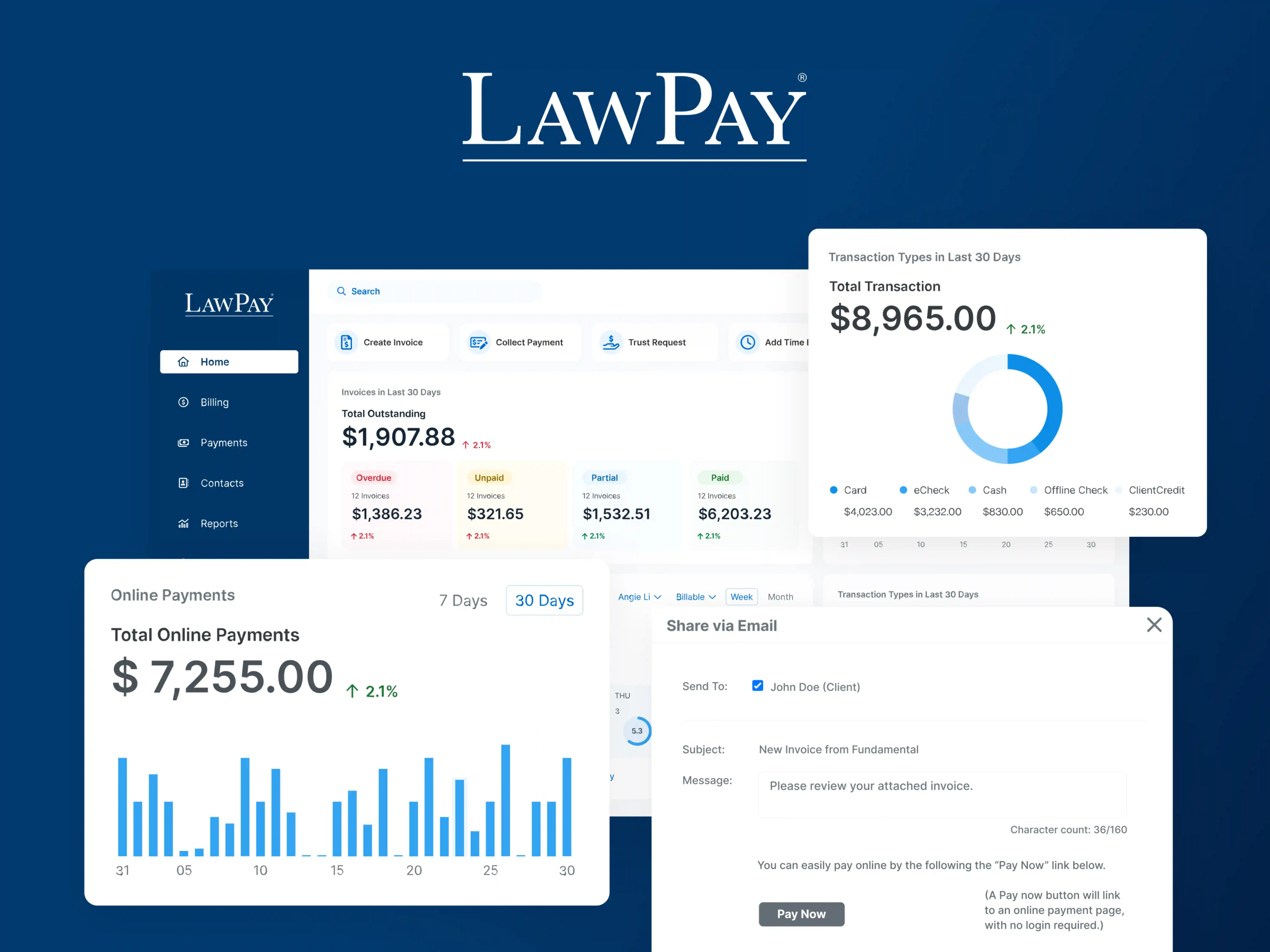Key takeaways
Commingling of funds refers to the mixing of funds that are ethically and/or legally required to be kept separate (e.g., retainer funds that were supposed to be deposited in the IOLTA and placed into the firm's operating account).
While commingling funds is not illegal across all industries, it is a serious crime for lawyers and is grounds for disbarment.
Many lawyers experience a great deal of confusion about trust accounting—particularly when it comes to commingling funds. In this article, we'll discuss the basics of fund commingling, the consequences, and how lawyers can avoid serious state bar violations by following proper trust accounting practices and using software designed specifically to support trust account compliance.
Commingling Funds Definition
Commingling of funds refers to the mixing of funds that are ethically and/or legally required to be kept separate (e.g., retainer funds that were supposed to be deposited in the IOLTA and placed into the firm's operating account).
While commingling funds is not illegal across all industries, it is a serious crime for lawyers and is grounds for disbarment.
When a lawyer takes on a client and accepts their money upfront (or holds funds on the client's behalf), the lawyer accepts a fiduciary responsibility to appropriately and legally handle those funds. Those funds, commonly referred to as a retainer, typically must be deposited in the lawyer's IOLTA.
BA Model Rule 1.15, the rule upon which many states’ rules are based, requires that lawyers avoid commingling to prevent unethical behaviors between lawyers and their clients. Ultimately, the rule exists to protect consumers.
What Are Examples of Commingling Funds?
When it comes to protecting yourself from accidental commingled funds, it helps to have examples of what not to do. Here are three quick examples of commingling funds you can avoid in your law practice.
Depositing client payments into the wrong account. Funds meant for a client trust account cannot be deposited into an attorney's business or personal bank account.
Using a trust account for personal expenses. Attorneys cannot pay office expenses, payroll, rent, etc., directly from a client's trust account.
Pulling funds from a trust account too soon. A client's payment may represent an advance of funds that the lawyer can bill against as they perform work for the client. In this circumstance, until the lawyer performs the work and invoices for that work to the client, those advanced funds constitute the client's property and must be held in a trust account by the lawyer.
Many lawyers accidentally engage in commingling due to confusion over which funds qualify as client funds that must be held in trust and which funds can be deposited into the firm's operating account. These funds must be held in a trust account:
Advance fees
Funds held for third parties
Court judgement funds
Escrow funds
Settlement funds
Potential Consequences of Commingling Funds
If a lawyer accidentally or intentionally commingles funds, they can face various professional and legal sanctions.
Commingling of funds by a lawyer constitutes a violation of their state bar's rules of professional conduct. This can subject the lawyer to discipline by the state bar, which can include a reprimand, suspension from the practice of law, or disbarment in particularly egregious circumstances.
Commingled funds can also constitute conversion. This may entitle the client to file a lawsuit against the lawyer to recover the funds belonging to the client that have been lost due to the lawyer's commingling.
In some states, conversion constitutes an ethical violation under the state's rules of professional conduct.
How Can Lawyers Avoid Commingling Funds?
If you want to avoid commingled funds, it is best to spend some time at your bank, ensuring your business accounts are set up properly. This will prevent hours of cleanup or the headache of paying an accountant to do it on your behalf.
Establishing dedicated accounts early on, practicing diligent documentation, and avoiding procrastination as much as possible will save you time, cost, and potential legal trouble. Exercising some best practices from the onset will also avoid major pitfalls for yourself and your business.
Separate Operating and Trust Accounts
Lawyers can avoid the risks of commingling funds by having two separate accounts: a trust account (also referred to as an IOLTA) for client and third-party funds and an operating account for collecting the fees the lawyer is legally entitled to and from which to pay their expenses. (Note: under some circumstances, state bars require law firms to open trust accounts.)
These trust accounts are usually subject to specific requirements, such as being held at a bank that has physical branches within the state. Depending on the bar, lawyers are also required to take specific actions with their trust account(s), including:
Reporting overdrafts to the state bar
Forwarding all accrued interest to the bar
Providing copies of canceled checks
Designating the account specifically as a trust account
While some law firms may only need one trust account to handle all client funds, opening separate trust accounts for each client may be appropriate for larger firms or those that handle complex legal matters. Practicing detailed and regular trust accounting can also avoid this risk.
Record Transactions Right Away
We understand tracking business and personal finances adds one more item to your already full task list. Throwing all your income and expenses into one pot—and promising yourself that you'll sort it out later—can seem like the easier option. However, the longer you wait to sort these items out, the harder it will be to do so, as eventually the transaction details may be forgotten.
The best way to avoid commingling funds is to record transactions as soon as possible – before you forget who the money came from and what it was for. If you are scrambling to get this done weekly or monthly, it could be time to hire someone to help with your law firm's accounting practices. By ensuring your personal and business funds stay separate, you'll save yourself (and your accountant) a lot of time and stress later.
Documentation
Online banking makes it incredibly easy to transfer money between accounts. If you make a transfer from your business checking account to your personal account or vice versa–document the reason. It's also vital to note withdrawals you make from your business checking account to pay for personal expenses.
We recommend keeping books in a user-friendly legal payment software like LawPay. Tracking transactions with an accounting system will help legitimize your business, give you better reporting and budgeting capabilities, and allow for better backup should you ever be audited by the IRS.
How To Correct Prior Commingling of Funds
What happens if you mix your personal and business accounts? Fixing commingled funds can be easy or extremely risky, depending on the circumstances. For LLCs and sole proprietorships, fixing commingling mistakes can be done using adjustable journal entries. A bit of accounting magic can reclassify the expense as either a contribution to or a distribution from the business, depending on the nature of the expense.
However, if you are operating a corporation, it becomes much harder to fix mistakes. You can still reclassify expenses using adjusting journal entries, but there's a solid chance the IRS may review the entries and ultimately disapprove of the adjustments. Recognizing the mistake early makes it easier to fix. Once you've realized the error, here are the steps you can take to get back on track.
Identify the personal transactions. Comb through your business financials and find every transaction that looks like a personal expense. This can be time-consuming if your business has numerous transactions throughout the year, but it's vital to be thorough in this step! Focus on these red flag areas; the IRS is known to pay extra attention to hotels/travel, meals/groceries, personal car payments, personal rent payments, home office expenses, cosmetics/clothes, and entertainment.
Classify your transactions correctly. Once you have found all the personal transactions throughout the current tax year, you need to identify how to handle them. As discussed earlier, one best practice is to amend your payroll reports and book the purchase as fringe benefit compensation. This method can resolve the issue, but the process is time-consuming and expensive.
Enlist the help of an accountant. Suppose you want to effectively correct your mistake and put systems into place to avoid further issues that may eventually lead to discipline or civil action. In that case, it can be helpful to enlist the assistance of a subject matter expert, such as a controller or CPA.
Ensure Trust Account Compliance Regarding Commingling Funds
Payments from a trust account can generally be made to pay the costs and expenses of a client's case, settlement proceeds, or the lawyer's earned, undisputed fees. However, law firms are permitted to deposit personal or business funds into a trust account. This is often done to either open the account or to cover account expenses, such as maintenance fees, since those expenses may not be paid from the client or third-party funds.
You should always avoid disbursing uncleared funds from a trust account. This runs the risk of preventing those uncleared funds from being collected by your bank, which can lead to you disbursing funds that legally belong to another client or party, or your trust account being hit with insufficient funds.
State bar trust accounting rules usually require you to keep a general ledger for an account, as well as separate client ledgers if more than one client's or third party's funds are held in an account. These ledgers must be regularly reconciled against the account statements you receive from the bank.
You can use paper bookkeeping or Excel spreadsheets to keep track of your trust accounting, but specialized trust accounting software can make the process considerably more manageable.
If your firm uses electronic payment processing, it can prove extremely helpful to work with a payment processor designed specifically for the legal industry. Legal-specific payment processors will often be able to separate earned and unearned fees and charge payment processing costs to your operating account, rather than deducting it from the client or third-party funds from the trust account.
LawPay: Helping Lawyers Prevent Commingling of Funds
Schedule a demo to see what LawPay can offer your firm.
Book Now
Lawyers have a legal and ethical obligation to perform accurate trust accounting to avoid the risk of commingling client funds. We built LawPay with input from bar association partners and their ethics committees to ensure all credit card, debit card, and eCheck payments are processed in compliance with lawyer trust accounting rules.
We know there are severe consequences for trust account violations, which is why we're committed to keeping you compliant.
To learn how LawPay can help your firm easily manage trust accounting and avoid commingling, schedule a demo today.
About the author

Hannah DeFreitasSenior Content Writer
Hannah DeFreitas is a Senior Content Writer for leading legal software brands, including MyCase, Docketwise, CASEpeer, and LawPay—the #1 legal payment processor. She distills industry trends and data into strategic insights that empower legal professionals to streamline workflows, increase revenue, and gain a competitive edge.
